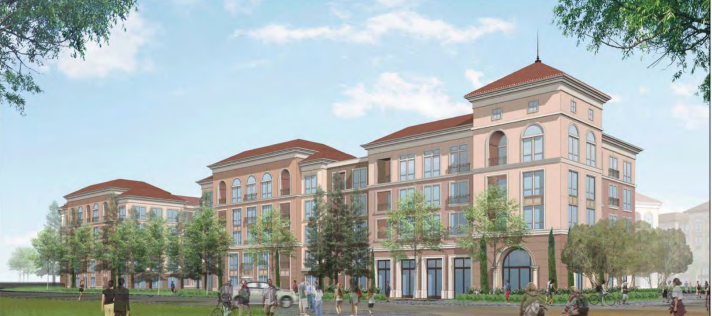The recent California Environmental Quality Act (CEQA) lawsuit filed by the Laborers International Union of North America (LIUNA) Local 270 against developer Irvine and the City of Sunnyvale over the 1 AMD Place project isn’t an anomaly.
It’s a strategy: Threaten builders and projects with superfluous, time-consuming and costly CEQA reviews unless they sign project labor agreements — PLAs. Jennifer Hernandez, head of San Francisco-based Holland & Knight’s environmental law practice, documented the practice — “greenmail” — in detail in a 2015 study (tinyurl.com/ceqastudy).
“Agencies that declined to require Project Labor Agreements (PLAs) as conditions of project approval have been particular targets of these labor tactics,” wrote Hernandez.
The 1 AMD Place lawsuit is only one of an extensive catalog of CEQA complaints filed in California and Santa Clara County by construction unions. LIUNA is the most active of these, but the Carpenters, International Brotherhood of Electrical Workers and California Unions for Reliable Energy also have solid track records.
Many times union groups with community-sounding names — for example, Santa Clara County Residents for Responsible Development, San Jose Residents for Responsible Development, Coalition for Responsible Development — file the complaints and bring the lawsuits.
Contra Costa County Residents for Responsible Development, for example, identifies itself as “an unincorporated association of individuals and labor organizations” that includes the International Brotherhood of Electrical Workers Local 180, Plumbers & Steamfitters Local 343, Sheet Metal Workers Local 104 and Sprinkler Fitters Local 483.
Santa Clara County Residents for Responsible Development makes no secret of its agenda. It aims “to capture 2 million MEPS [Mechanical, Electrical, Plumbing and Sprinkler Fitters] hours by securing agreements on the majority of the downtown residential towers and larger multi-unit projects of over 200 units,” according to the group’s website. SCC Residents for Responsible Development’s Director is Josue Garcia, CEO of the Santa Clara/San Benito County Building Trades Council.
Another such group, the Coalition for Responsible Equitable Economic Development in Los Angeles explains on its website that it “fights to ensure that developers pay fair wages to all the hard-working construction professionals throughout the industry while simultaneously providing them with quality health care, continued training, and trustworthy retirement plans.”
There are also law firms specializing in this kind of CEQA activity, and two firms — Lozeau Drury and Adams Broadwell Joseph & Cardozo — are engaged in the lion’s share of these lawsuits. Lozeau Drury represents LIUNA Local 270, while Adams Broadwell Joseph & Cardozo represents the “Residents for Responsible” groups, the Building Trades Council and other construction unions.
Since 2016 these two firms have made more than 100 CEQA complaints against a variety of California development projects, according to PhonyUnionTreeHuggers.com,* which provides links to the complaints. Many are in the Bay Area, with six in Santa Clara — including a complaint against the 900 Winchester Agrihood.
LIUNA filed CEQA suits against San Jose in 2018 and 2019. Both were dismissed after San Jose reached settlements with the union.
LIUNA shows up in other parts of California in CEQA complaints and legal actions. For example, Voice of San Diego’s Lisa Halverstadt reported in 2015 about several CEQA lawsuits filed by the LIUNA.
In at least one case, a 2012 suit against a proposed solar energy project, the project was one of 20 such projects under development or on the drawing board. But it was the only one being sued under CEQA, Halverstadt reported. LIUNA was concerned about how the project would affect burrowing owls, but didn’t explain why only that project would affect the owls and the other 19 wouldn’t.
Two months after filing the suit, the company reached a deal with the union, according to Halverstadt, and later that year asked for dismissal.
In August 2018 LIUNA Local 270 filed a lawsuit (Case No. 18CV333588) against the City of Santa Clara, after filing an appeal against the City’s determination that an EIR wasn’t needed — a negative mitigated declaration — for a data center project on Mission College Boulevard. The case is still in court. LIUNA also filed a CEQA lawsuit against Mountain View in May.
*This website doesn’t identify its owners or backers. However, its document links are to primary sources that can be validated on public agency websites.




View Comments (1)
That's me. I'm the guy who runs the website phonyuniontreehuggers
;<)